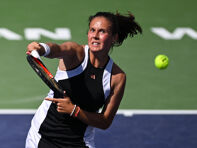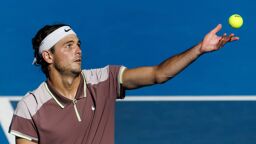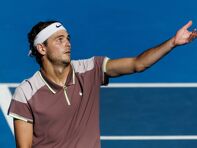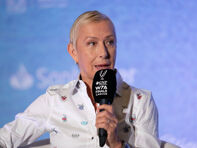It’s been just over a year since Nadia Podoroska spoke publicly for the first time about her relationship with fellow Argentine tennis professional, Guillermina Naya.
In singles, it’s been a trying 2023 for the 26-year-old in Grand Slams and WTA 1000 events, but she has regained her top-100 singles ranking and her year is ending with an exciting development in doubles — Naya is now her playing partner too.
The couple won their first competitive match together in the last-16 of the LP Open in Chile, a WTA 125 event, and although their challenge was ended in the next round by third-seeds Conny Perrin and Julia Lohoff, an ambition was realized.
“We’d wanted to play together for a long time,” Podoroska told tennis outlet Clay. “We joked and imagined when it was going to be.
Get off the sidelines and into the game
Our weekly newsletter is packed with everything from locker room chatter to pressing LGBTQ sports issues.
“Beyond the results, I like being able to share the court with her, something we both do separately, but being able to do it together is something special.”
For Naya, who was featuring in a main WTA draw for the first time, the extra pressure made her “pretty tense.” Being a lower-ranked player, the 27-year-old doesn’t cross paths with Podoroska very often at events.
“It motivates me to keep improving in the ranking and to be able to play more tournaments,” she said.
Podoroska faced Perrin — who is also LGBTQ — again in the singles competition in Santiago, winning that match on course to the quarterfinals.
That run has been a tonic after the disappointment of Argentina’s recent Billie Jean King Cup playoffs loss to Slovakia, after which Podoroska was criticized in the national media for her shock straight-sets defeat by 16-year-old Renata Jamrichova.
Naya was also part of the Argentine team in Bratislava and writing on social media, she suggested the online backlash had been hateful.
“It’s exhausting and painful to read such things loaded with so much evil,” she said on Instagram. “We and the crew know all the work that has been put in and how much it hurts to lose this series.”

Meanwhile, one of the major talking points in women’s tennis at the moment is the prospect of the season-ending WTA Finals moving to Saudi Arabia.
Previously, reports suggested several players on tour were uncomfortable with the idea of the WTA’s showpiece tournament being played in a country where homosexuality is a crime and women are second-class citizens.
However, the situation seems to be shifting in Saudi’s favour — last month’s Finals in Cancun were a somewhat chaotic affair, the financial numbers are unsurprisingly much more appealing to the WTA (there is talk of trebling the prize money) and even Billie Jean King is beginning to get on board, saying that the move feels inevitable anyway and that “engagement” is the best strategy.
Yet for Podoroska, it’s still the voices of the current crop of professionals that should be coming to the fore on this issue.
“The WTA should listen to the players, to women in general,” she told Clay.
“In my case, I would not support the WTA Finals to be played in Saudi Arabia.
“It’s good that there’s a lot of money in that part of the world and this is a business too. The wheel has to turn, I understand that.
“And without money, we don’t play either, it’s a bit difficult on that side, but for me there are limits.”
There are several other players who are publicly out as LGBTQ on the WTA Tour including Daria Kasatkina, Greet Minnen, Alison van Uytvanck and Demi Schuurs, but there has still never been an active out gay or bi male professional player in the Open era.
Sadly, Naya doesn’t see that situation changing any time soon due to the culture of men’s sport.
“The one who doesn’t talk much, the one who is shy, people immediately say ‘he’s gay.’ That way he will never accept himself, he will never want to get close to someone,” she said in the Clay Q&A.
“It’s not the same for women, that’s why it’s “easier” to be able to share and accept it. In men, it’s much tougher.”






































